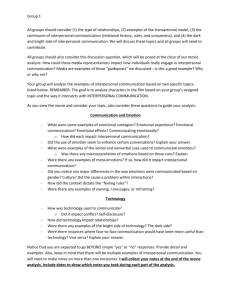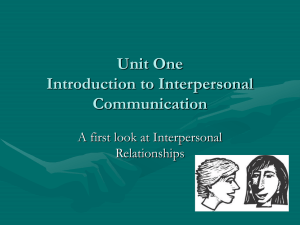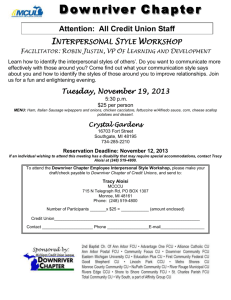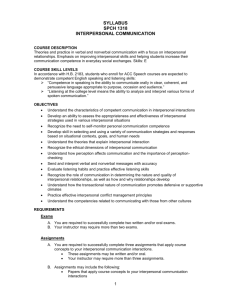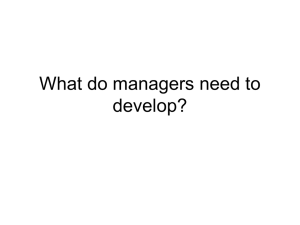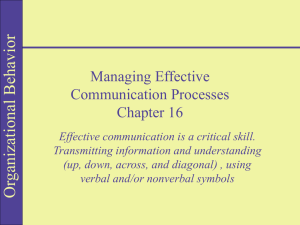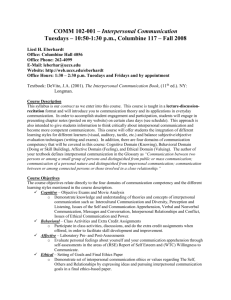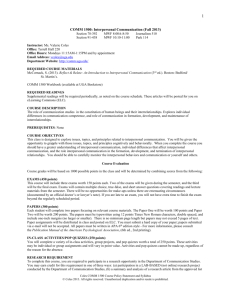Interpersonal Communications/CMST 102 – 3 credits
advertisement
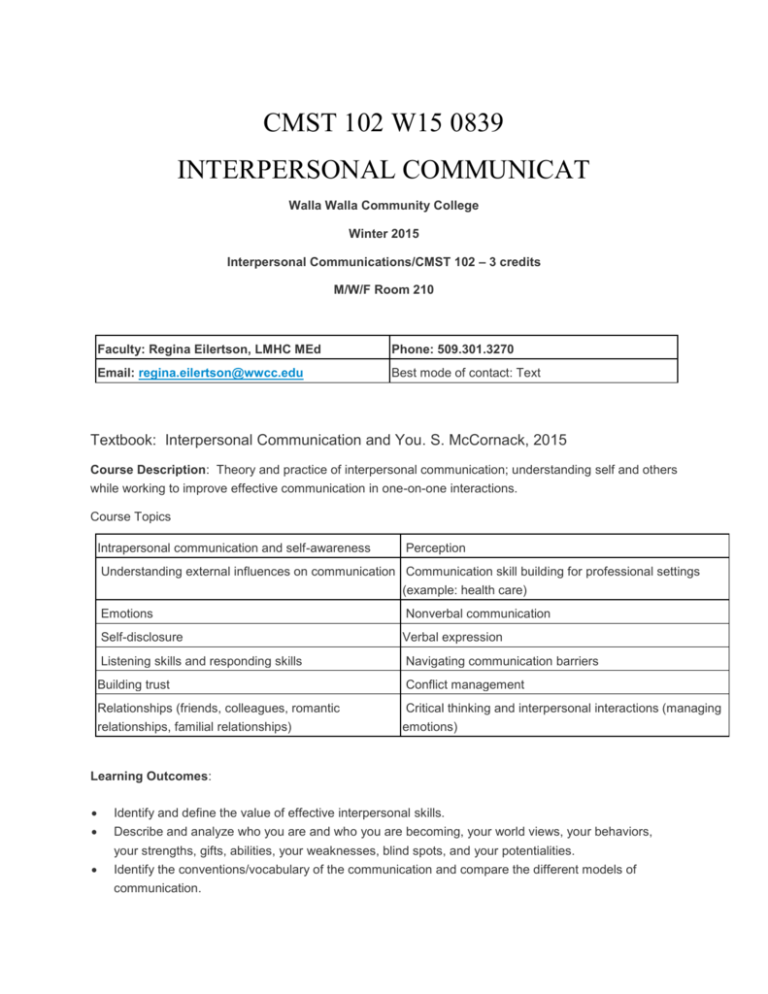
CMST 102 W15 0839 INTERPERSONAL COMMUNICAT Walla Walla Community College Winter 2015 Interpersonal Communications/CMST 102 – 3 credits M/W/F Room 210 Faculty: Regina Eilertson, LMHC MEd Phone: 509.301.3270 Email: regina.eilertson@wwcc.edu Best mode of contact: Text Textbook: Interpersonal Communication and You. S. McCornack, 2015 Course Description: Theory and practice of interpersonal communication; understanding self and others while working to improve effective communication in one-on-one interactions. Course Topics Intrapersonal communication and self-awareness Perception Understanding external influences on communication Communication skill building for professional settings (example: health care) Emotions Nonverbal communication Self-disclosure Verbal expression Listening skills and responding skills Navigating communication barriers Building trust Conflict management Relationships (friends, colleagues, romantic Critical thinking and interpersonal interactions (managing relationships, familial relationships) emotions) Learning Outcomes: Identify and define the value of effective interpersonal skills. Describe and analyze who you are and who you are becoming, your world views, your behaviors, your strengths, gifts, abilities, your weaknesses, blind spots, and your potentialities. Identify the conventions/vocabulary of the communication and compare the different models of communication. Utilize a range of effective interpersonal skills to establish positive rapport and manage conflict with friends, colleagues, romantic relationships and familial relationships as demonstrated through journeling and self-reflection. Describe the five stages of the listening process. Demonstrate strategies for improving listening skills. Construct and integrate strategies to deal with emotional challenges such as communicating empathy, managing anger, and dealing with grief. Identify and plan ways to skillfully manage and express emotions. Role play verbal and nonverbal characteristics of language and differentiate between them. Identify and explain the challenges to resolving conflict in close relationships, and how to overcome them. Classroom Policies: Face-to-Face (F2F) Attendance – This course is a HYBRID, which means the class is conducted in a traditional, face-to-face setting, as well as online. We meet every Monday and Wednesday during the term from 11:30-12:20 am in Rm. 210. We will NOT meet on campus on Friday’s. Monday and Wednesday class time will be used primarily for lectures and other learning interactions. Our time together is limited so lectures will be fast-paced and will highlight the most crucial topics. You are responsible for information in the book that is not focused on during F2F time. Attendance will be taken each period and a portion of the final grade will be based upon participation in class activities. Points attributed to these sessions CANNOT be made up for any reason. Journal – You will be expected to complete a weekly journal entry which will be submitted for grading. You will need to type your entry and submit them electronically to me by Thursday each week. I will give you a journal topic on Monday in class and post it in canvas. These assignments are intended to prompt reflective thinking about our classroom discussions not simply about your day. You will be graded on content and grammar. Online Assignments – Your FRIDAY class time will be spent completing homework, group discussions, quizzes, etc. in the online classroom by the specific due dates indicated. To log in to your account, go to https://wwcc.instructure.com/. Late homework will not be accepted without permission in advance of the respective due date. In these cases students will be offered 3 additional days to complete the assignments for half credit. Due to the interactive nature of the Discussion Forums, no credit will be assigned to late entries. Exams – There will be four exams given during the quarter. These exams are included in the online portion of the class. Exams will only be given in the canvas classroom and will opened for 3 days. Each test will be timed and multiple choice. Extensions needed for exams must be PRE-approved by the instructor. (400 points possible) Extra Credit: Extra credit may be earned by completing an additional assignment during week 7 which is worth up to 20 points. This homework assignment will be given during the F2F portion of class and will not be available to you if you miss class. Points earned on this assignment will be added to your lowest test score. Ground Rules for Success To ensure the best learning environment for every student in this course and maximize your success, please commit yourself to the following: RESPECT– maintaining a respect for the integrity of the learning environment is paramount to academic success. A demonstration of respect for your instructor, other students, and psychology as a discipline is expected from everyone in this class. For more details, please refer to the Student Handbook/Code of Conduct. Attendance & Participation – Research has revealed that the number one practice in successful learning is faithful class attendance. I make the commitment to be in class each session; I expect the same commitment from you. Activities done face-to-face cannot be made up and homework is to be turned in on time. Holding side conversations during class, reading or working on homework for other classes during class time, and playing with cell phones, MP3s, etc. compromises the learning environment for you as well as your fellow students. These behaviors do not demonstrate a respect for the scholarly learning community we are trying to develop. Please commit to bringing an attentive, learning attitude to each class period. You may consume snacks and beverages during class. Please clean up any drink containers, papers, and the like and thrown them away at the end of class. Honesty & Integrity – Cheating as defined by Webster’s Dictionary is, “the act of practicing fraud or deceit upon another; to violate rules or regulations.” The first time a student is found copying another’s homework, class work, or exam, or plagiarizing, they will receive an F for that assignment, exam, etc. Any student found cheating or plagiarizing a second time will automatically receive an F for the final quarter grade. Cell Phones, Laptops, etc. – any technology used during class should be supporting the class activity. Cell phones should not be seen or heard – if you need to keep a phone on vibrate in your pocket for emergencies, please make sure to exit the room before engaging in conversation. If you need to use a laptop in class to support your learning, please let me know. Students who are texting, holding side conversations, etc., during class will forfeit their attendance points. Disability Accommodations: If you have a disability for which you feel you may need academic accommodations, contact Dr. Claudia Angus, Disability Services Coordinator, whose office is in the Student Development Center. To make an appointment with Claudia, call 509-527-4262 or stop by the Student Development Center.

